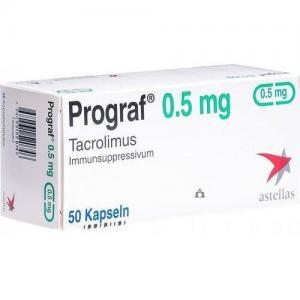Prograf (Tacrolimus)

Dosages
Prograf 0.5 mg
| Quantity | Price per pill | Total price | |
|---|---|---|---|
| 20 | €2.88 | €57.61 | |
| 30 | €2.77 | €83.03 | |
| 60 | €2.54 | €152.50 | |
| 90 | €2.29 | €205.87 | |
| 120 | €2.12 | €254.16 | |
| 180 | €1.95 | €350.74 | |
| 270 | €1.78 | €480.36 | |
| 360 | €1.69 | €609.98 |
Prograf 1 mg
| Quantity | Price per pill | Total price | |
|---|---|---|---|
| 10 | €3.90 | €38.97 | |
| 20 | €3.09 | €61.85 | |
| 30 | €2.80 | €83.87 | |
| 60 | €2.58 | €155.04 | |
| 90 | €2.46 | €221.12 | |
| 120 | €2.37 | €284.66 | |
| 180 | €2.20 | €396.49 | |
| 270 | €2.03 | €548.99 | |
| 360 | €1.86 | €670.98 |
Payment & Shipping
Your order is carefully packed and ships within 24 hours. Here’s the typical package.
Sized like a regular personal letter (9.4×4.3×0.3 inches / 24×11×0.7 cm), with no indication of its contents.



| Shipping Method | Estimated delivery |
|---|---|
| Express Free for orders over €300.00 | Estimated delivery to the U.S.: 4-7 days |
| Standard Free for orders over €200.00 | Estimated delivery to the U.S.: 14-21 days |








Discount Coupons
- Independence Day - Jul 4, 2025 10% JULY410
- Labor Day - Sep 1, 2025 7% LABOR07
- Thanksgiving - Nov 27, 2025 9% THANKS09
Brand Names
| Country | Brand Names |
|---|---|
 Argentina Argentina | Protopic Tacraf Tacro-Tic Tacroinmun |
 Belgium Belgium | Prograft Protopic |
 Brazil Brazil | Protopic |
 Canada Canada | Advagraf Protopic |
 Czechia Czechia | Advagraf Protopic Protopy |
 Denmark Denmark | Advagraf Protopic |
 Finland Finland | Protopic |
 France France | Advagraf Protopic |
 Germany Germany | Advagraf Protopic |
 Greece Greece | Advagraf Protopic |
 Hungary Hungary | Protopic |
 Italy Italy | Advagraf Protopic |
 Japan Japan | Protopic |
 Malaysia Malaysia | Protopic |
 Mexico Mexico | Framebin Limustin Proalid Protopic Traderma |
 Netherlands Netherlands | Prograft Protopic Protopy |
 Norway Norway | Advagraf Protopic |
 Poland Poland | Advagraf Protopic |
 Portugal Portugal | Advagraf Protopic Protopy |
 Spain Spain | Advagraf Protopic |
 Sweden Sweden | Advagraf Protopic |
 United States United States | Protopic |
| Manufacturer | Brand Names |
|---|---|
| Bharat Serums And Vaccines Limited | Tacimun Tacrograf |
FAQ
Description
Several drugs are particularly well-known in the pharmaceutical industry for their exceptional ability to treat various medical ailments. Prograf is among such medications. Prograf is frequently administered to patients undergoing transplantation and to those suffering from particular autoimmune illnesses. It is essential in suppressing the immune system to avoid organ rejection or lessen autoimmune disease symptoms.
Prograf: What Is It?
Prograf, sometimes referred to as tacrolimus in its generic form, is an immunosuppressive drug. It limits the body's immunological response by blocking the functioning of specific immune system cells. This immunosuppressive effect is essential in keeping the recipient's immune system from rejecting transplanted organs such as the liver, heart, kidneys, or lungs.
How Does Prograf Work?
Prograf's capacity to connect to a protein known as FK-binding protein-12 (FKBP-12) is part of its mode of action. Then, this Prograf-FKBP-12 combination inhibits the calcineurin enzyme. The immune response is mediated by T-lymphocytes, a subset of white blood cells activated by calcineurin. Prograf reduces the activation of T-lymphocytes and their subsequent proliferation by blocking calcineurin, which in turn attenuates the immunological response.
 Uses of Prograf
Uses of Prograf
- Prograf is mainly recommended for patients who have had liver, heart, kidney, or lung transplants to prevent organ rejection. It is usually taken as part of a thorough post-transplant protocol together with other immunosuppressive drugs.
- Prograf is indicated not only for transplantation but also for the management of several autoimmune conditions, including eczema, psoriasis, and rheumatoid arthritis. It reduces tissue damage-causing aberrant immune response to help with symptoms in several illnesses.
Dosage
| Indication | Initial Oral Dose | Maintenance Oral Dose Range | Monitoring |
|---|---|---|---|
| Kidney Transplantation | 0.10 - 0.20 mg/kg/day in 2 divided doses | 0.05 - 0.15 mg/kg/day in 2 divided doses, adjusted based on clinical response and tacrolimus trough levels | Tacrolimus trough levels (e.g., 5-15 ng/mL) should be monitored regularly, typically 2-3 times per week initially, then less frequently |
| Liver Transplantation | 0.10 - 0.20 mg/kg/day in 2 divided doses | 0.05 - 0.15 mg/kg/day in 2 divided doses, adjusted based on clinical response and tacrolimus trough levels | Tacrolimus trough levels (e.g., 5-20 ng/mL) should be monitored regularly, typically 2-3 times per week initially, then less frequently |
| Heart Transplantation | 0.075 - 0.15 mg/kg/day in 2 divided doses | 0.05 - 0.10 mg/kg/day in 2 divided doses, adjusted based on clinical response and tacrolimus trough levels | Tacrolimus trough levels (e.g., 5-15 ng/mL) should be monitored regularly, typically 2-3 times per week initially, then less frequently |
| Lung Transplantation | 0.075 - 0.15 mg/kg/day in 2 divided doses | 0.05 - 0.10 mg/kg/day in 2 divided doses, adjusted based on clinical response and tacrolimus trough levels | Tacrolimus trough levels (e.g., 5-15 ng/mL) should be monitored regularly, typically 2-3 times per week initially, then less frequently |
Adverse Reactions to Prograf
Prograf has drawbacks even though it works wonders in controlling autoimmune disorders and preventing organ rejection. Among the most common adverse effects of using Prograf are:
- Increased susceptibility to infections: Individuals on Prograf are more likely to get infections because this medicine lowers the immune system. Since the immune system is weakened, this danger is exceptionally high in the early post-transplant phase.
- Renal toxicity: Extended usage of Prograf may damage the kidneys, which may manifest as reduced renal function or even renal failure. Renal function monitoring is crucial for individuals on Prograf therapy.
- Neurological adverse effects: Prograf, especially at higher doses, can produce neurological side effects such as tremors, migraines, and confusion. Usually, these symptoms can be reversed by changing the dosage or stopping the drug.
- Metabolic disturbances: Prograf may change how some chemicals are metabolized by the body, which can result in hyperglycemia (high blood sugar), hyperkalemia (high potassium levels), and electrolyte abnormalities.
Prograf, or tacrolimus, is a potent immunosuppressive drug frequently used to treat autoimmune diseases and facilitate organ donation. Healthcare practitioners can maximize the use of this medication while lowering patient risks by being aware of its mechanism of action, indications, and possible side effects. In spite of its adverse effects, Prograf is still a vital weapon in the fight against autoimmune illnesses and organ rejection, providing countless people all over the world with hope for better results and a higher standard of living.









